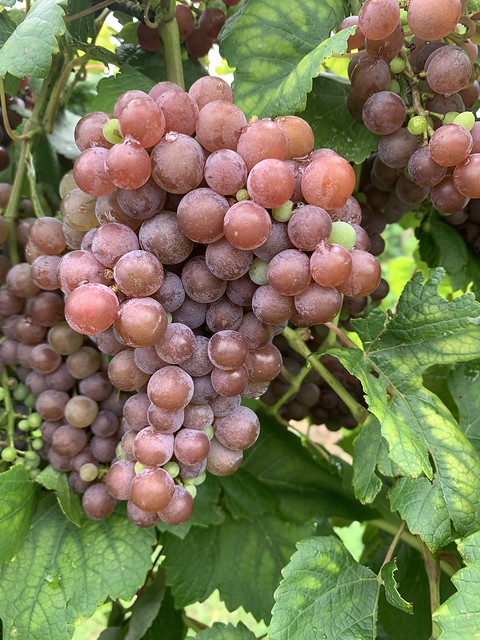Jan. 28, 2021
Division of Agriculture releases 2 new wine grapes
By Fred Miller
U of A System Division of Agriculture
@AgNews479
Fast facts
- Division of Agriculture releases two new wine grapes
- Grapes offer muscat and Gerwürztraminer-type wines
(725 words)
Download related PHOTOS: https://flic.kr/s/aHsmTY2RrX
FAYETTEVILLE, Ark. — Two new wine grapes from the University of Arkansas System Division of Agriculture offer novel commercial options that are adapted for growing in Arkansas vineyards.
Indulgence is a white wine grape that produces wines with a muscat flavor, said John Clark, Distinguished Professor of horticulture and fruit breeding for the Arkansas Agricultural Experiment Station, the research arm of the Division of Agriculture.
Renee Threlfall, research scientist in the division’s department of food science, said Indulgence produces wine with floral, fruity and herbal aromas.
Dazzle is a pink grape that produces a white Gerwürztraminer-type wine, Clark said. Threlfall added that it has a spicy aroma in addition to the floral, fruity and herbal aromas.
Indulgence and Dazzle expand options for commercial production in Arkansas and other areas with similar growing conditions. Threlfall said both grapes can produce single-varietal wines or can be blended with other wines to enhance their flavors or aromas.
Indulgence and Dazzle follow the rich, red Enchantment and the neutral white Opportunity, the first two wine grapes from the Division of Agriculture’s fruit breeding program.
Clark said the original crosses to produce these grapes were made by the late James N. Moore, who founded the Arkansas fruit breeding program in 1964.
“Many Mid-South, Midwest, eastern U.S. and Arkansas wineries are using French-American hybrids, or wine grapes developed in New York that are not ideal for Arkansas,” Clark said. “Dr. Moore’s aim was to develop good quality grapes with substantial flavor that could grow in Arkansas’ environmental conditions.
“Developing a wine grape just takes a long time,” Clark said. “It requires years of input from industry to develop and advance breeding lines toward a grape that meets their needs.” Clark added that you have to make and test wines to make sure they’re not only desirable to consumers, but stable and consistent in storage, handling and serving.
Moore worked with the late Justin Morris, a division food scientist who specialized in viticulture and worked on vineyard management and winemaking for Arkansas. Their partnership lasted many years and continues today in the hands of Clark and Threlfall, who began their careers in Arkansas under Moore’s and Morris’ mentorship.
“These wine grapes are truly heritage projects,” Clark said.
At harvest, Indulgence averages 37 pounds per vine. Its muscat flavor is strong in the juice at crush, Threlfall said, and it was consistent in all years. Juice yield is one gallon for 13 pounds of fruit, and it averages 37 pounds of fruit per vine.
“For wine production, Indulgence needed sugar additions most years and acid additions some years,” Threlfall said. “Ethanol levels of wines were 10-12 percent.”
Technical information on Indulgence’s fruit and wine compounds and titratable acidity can be found online: Indulgence Specs
Dazzle makes about a gallon of juice from 14 pounds of fruit, Threlfall said, and averaged about 22 pounds of fruit per vine.
“Flavor is light, semi-fruity, reflective of its Gerwürztraminer parent, and was consistent in all years,” Threlfall said.
“For wine production, Dazzle usually did not need sugar or acid additives,” she said. “Ethanol levels of wines were 10 to 12 percent.”
Technical information on Dazzle’s fruit and wine compounds and titratable acidity can be found online: Dazzle Specs
“Soon, wine enthusiasts can purchase bottles of Indulgence and Dazzle wines, not only to enjoy the unique aromas and flavors, but also for the experience of drinking these wines made from grapes developed in Arkansas,” Threlfall said. “Imagine drinking a wine that was made in Arkansas, with grapes grown in Arkansas, and that the grapes for the wine were bred in Arkansas.”
The average harvesting date for Dazzle is Aug. 15, Clark said. Indulgence ripens about Aug. 14. Both grapes have endured winter temperatures down to 1 degree Fahrenheit without damage to canes or buds, he said.
Powdery mildew was seen on Indulgence in four out of 26 years of observation for disease and in two out of 22 years on Dazzle, Clark said. Downy mildew was not observed in either grape, even in heavy years for the disease. Black rot and anthracnose also were not observed. Fungicides were used in research vineyards and these varieties will need disease control similar to most bunch grapes.
Dazzle and Indulgence are available for license to propagators. Interested parties should contact Cheryl Nimmo at 479-575-3953 or by email at cnimmo@uark.edu for license availability.
To learn more about Division of Agriculture research, visit the Arkansas Agricultural Experiment Station website. Follow us on Twitter at @ArkAgResearch and Instagram at ArkAgResearch.
About the Division of Agriculture
The University of Arkansas System Division of Agriculture’s mission is to strengthen agriculture, communities, and families by connecting trusted research to the adoption of best practices. Through the Agricultural Experiment Station and the Cooperative Extension Service, the Division of Agriculture conducts research and extension work within the nation’s historic land grant education system.
The Division of Agriculture is one of 20 entities within the University of Arkansas System. It has offices in all 75 counties in Arkansas and faculty on five system campuses.
Pursuant to 7 CFR § 15.3, the University of Arkansas System Division of Agriculture offers all its Extension and Research programs and services (including employment) without regard to race, color, sex, national origin, religion, age, disability, marital or veteran status, genetic information, sexual preference, pregnancy or any other legally protected status, and is an equal opportunity institution.
Media Contact: Fred Miller
U of A System Division of Agriculture
Arkansas Agricultural Experiment Station
(479) 575-5647
fmiller@uark.edu
Related Links
